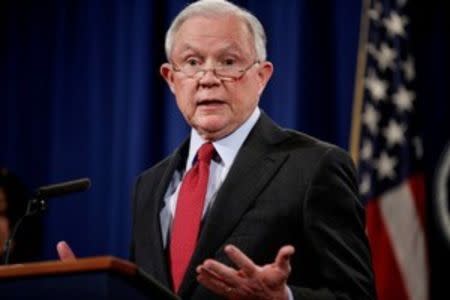States with legal pot denounce federal marijuana crackdown
By Chris Prentice NEW YORK (Reuters) - Lawmakers in U.S. states that have legalized marijuana denounced a move by the Trump administration on Thursday to cancel a policy that kept federal prosecutors at bay from the fledgling cannabis industries and vowed to uphold their state laws. U.S. Attorney General Jeff Sessions announced that the Justice Department was rescinding an Obama-era policy that eased enforcement of federal marijuana laws amid a wave of legalization in states from Pennsylvania to Alaska. The shift came just three days after California launched the world's largest regulated commercial market for recreational marijuana. State officials said the move amounted to meddling in states' affairs and ignored more pressing priorities like the opioid crisis. It was not clear how the change might affect a burgeoning marijuana industry in the six states including California and Colorado that have legalized the drug for recreational use, plus dozens of others that permit medicinal use. The industry is forecast to reach nearly $23 billion in sales by 2021. California's attorney general, Xavier Becerra, vowed to "vigorously enforce our state's laws and protect our state's interests." "In California, we decided it was best to regulate, not criminalize, cannabis," he said. "Unlike others, we embrace, not fear, change. After all, this is 2018 not the 20th century." Alaska Attorney General Jahna Lindemuth said her office was evaluating the potential impact of the change, while pledging to "uphold and implement state law." In Nevada, Attorney General Adam Paul Laxalt affirmed his promise to protect the law, despite having opposed the ballot initiative that voters approved. JOBS AND HEALTH Massachusetts Attorney General Maura Healey, a Democrat, said the move "inexplicably" directed federal law enforcement resources away from an opioid epidemic that she said was ravaging communities. Republican Senator Cory Gardner of Colorado said the decision on marijuana use must be left up to the states and that the Justice Department had trampled on the will of voters in his state and elsewhere. Other states that allow the sale of marijuana for recreational use are Washington, Oregon, Alaska and Nevada. Maine and Massachusetts had looked likely to follow suit this year. At the center of the dispute is a policy under Democratic former President Barack Obama, known as the Cole Memo, that directed federal prosecutors not to interfere with state legalization efforts. Oregon's governor, Democrat Kate Brown, said in a statement that more than 19,000 jobs have been created in her state in a legal market that officials had "worked carefully to build in good faith and in accordance with the Cole Memorandum." Last year, Oregon collected over $60 million in state taxes related to the industry, Attorney General Ellen Rosenblum said, vowing to do protect the industry. Washington Governor Jay Inslee, a Democrat, said his state's pot laws keep criminals out of the market and stop the drug from reaching children or crossing borders to neighboring states. "We are going to keep doing that and overseeing the well-regulated market that Washington voters approved," he said. Bob Troyer, U.S. attorney for Colorado, said in a statement his office would continue to be guided by the same principles that have long governed prosecution decisions: "focusing in particular on identifying and prosecuting those who create the greatest safety threats to our communities around the state." Sessions' move on Thursday also raised questions about whether federal prosecutors could focus on medical marijuana programs run by states such as Pennsylvania. Pennsylvania's Democratic U.S. Senator, Bob Casey, said many children were among those in the state being prescribed medical marijuana for serious illnesses, adding the Justice Department's announcement caused "serious concerns." "Bureaucrats in Washington should not interfere with the medical care these patients are receiving," Casey said in a statement. (Reporting by Chris Prentice; Editing by Daniel Wallis and Leslie Adler)


